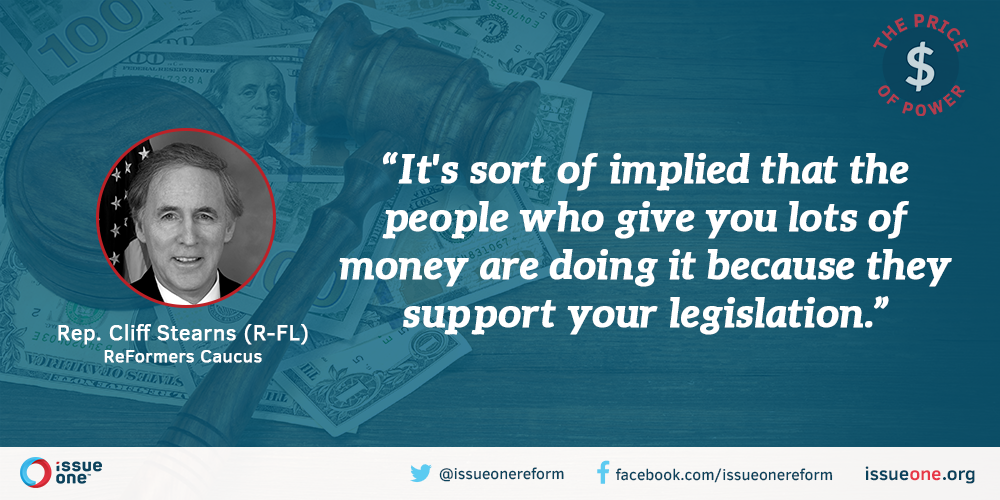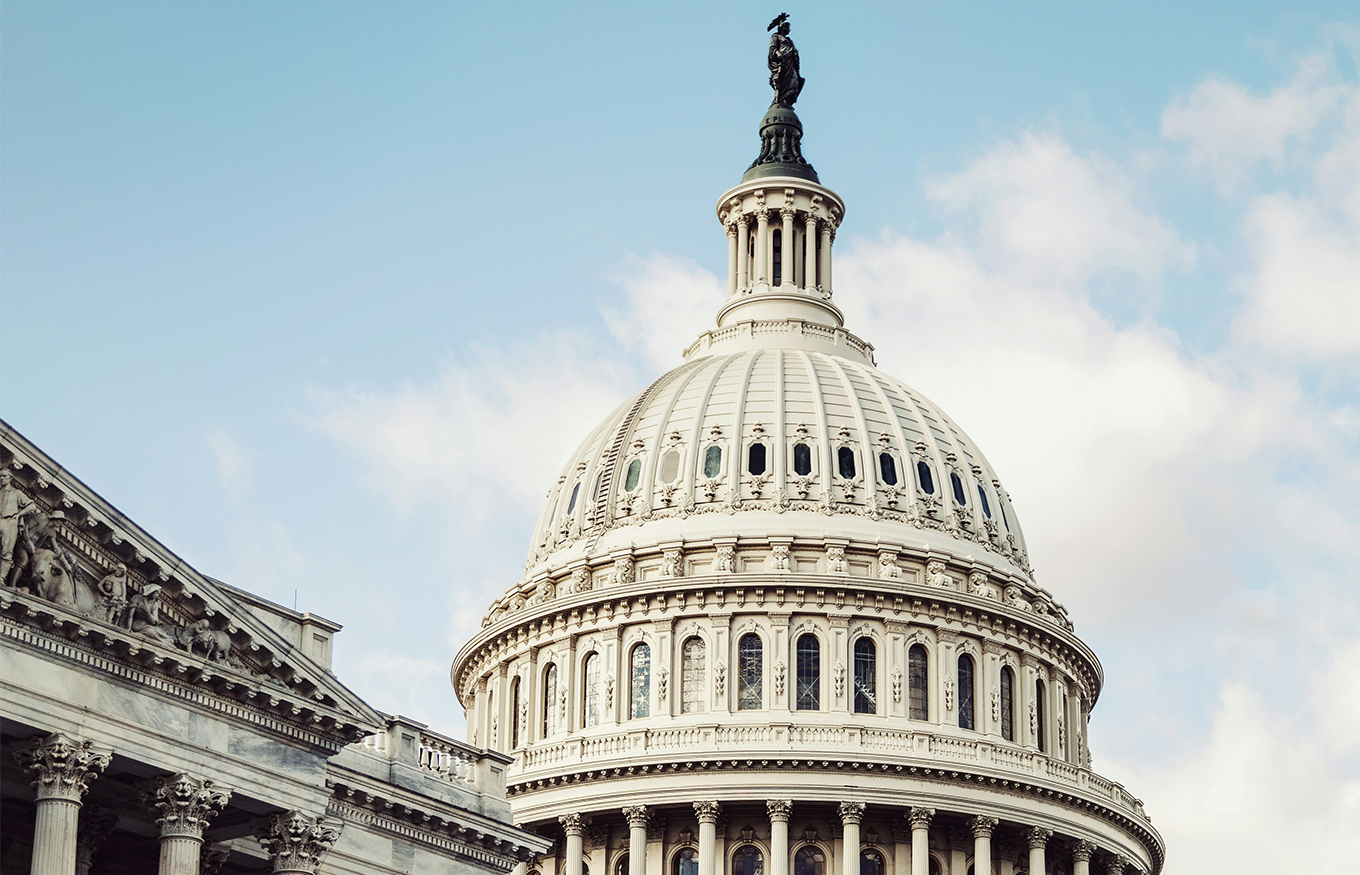To help inform Issue One’s landmark report, “The Price of Power,” we interviewed several members of our bipartisan ReFormers Caucus at-length about their experiences with fundraising and concerns with the “committee tax” imposed on lawmakers.
Every Tuesday and Thursday over the next few weeks, we will release edited excerpts of those conversations with these former lawmakers to supplement and expand on the disturbing picture the report painted: that of a broken democracy, which Congress itself must act to fix.
***
Cliff Stearns, a member of Issue One’s ReFormers Caucus, is a Republican who represented Florida’s 6th Congressional District in the U.S. House of Representatives from January 1989 until January 2013.
What did you make of the fundraising quota system imposed on committee and subcommittee chairs?
Party leaders want to be sure that you’re going to raise money off your subcommittee to help the National Republican Congressional Committee (NRCC) or Democratic Congressional Campaign Committee (DCCC). And that is understood, whether you’re a Democrat or Republican.
How was that message to fundraise sent?
They put your name up on a board at the NRCC to show how much you had raised for the NRCC, how much you pledged and how much was outstanding. And so everybody could see right away who the people raising the most money were. You had enormous pressure to raise a certain amount.
How did the fundraising by committee chairs evolve over the years you were in Congress?
Well, it wasn’t that way when we had more seniority. After the 1994 midterm election, once we took the majority, Republican House Speaker Newt Gingrich did away with seniority. And with Gingrich, it was established that you could only be a chairman for six years. That opened up a lot of slots, and there were new, competent people competing for the subcommittee chairs and the full committee chairs.
How did the fundraising pressures change after the Republicans took control of the House of Representatives?
To keep the majority, we had to raise a lot of money. That filtered down to all of us with a subtle requirement that you had to give generously to your party. And if you didn’t, it was considered a strong reason not to let you continue in a leadership position on a committee, because you weren’t participating.
Do you remember the first time that you were asked to raise that type of party dues?
It wasn’t as urgent until I became a senior member. And then, they would see that I won by 65 percent and that I had money in the bank, and then there was pressure.
How do you think committee chairmanships should be determined?
It should be based more upon competence, knowledge of the issues and past legislative activity.
Why do you think it’s problematic that committee chairs and subcommittee chairs are being asked to raise so much money?
The problem is, to raise this money, you have to have spent a lot of time to do it. Secondly, when you solicit this money, you have to be careful. You don’t want the legislative process and the fundraising process to intermingle. It’s sort of implied that the people who give you lots of money are doing it because they support your legislation.
Why do you think special interests are more apt to donate to a committee chairman?
Well, with the hope that they can influence them.
So how influential is money in the process?
Any time there’s a great deal of money involved, you have to worry about the influence, not just for the individual members of Congress but for leadership of both parties.
Can you say more about that?
Well, look at the influence that the pharmaceutical industry has had. Under President George W. Bush, you had the prescription drug program in Medicare Part D. Under President Barack Obama, you had the Affordable Care Act. PhRMA was down at the White House trying to make points and support the Affordable Care Act even though Republicans were against it. We, as Republicans, were just astonished to see them doing it.
Typically, how much time would you spend fundraising?
I did not face the same fundraising pressures that people in the most competitive races faced, but I still did fundraisers. We’d come in Mondays, so then on either Tuesday or Wednesday, I would have a fundraiser at the Capitol Hill Club. And on the weekends, I might have some fundraisers or dinners back in the district. On occasion, I’d have the leadership come in for a golf tournament, or have a Cabinet official, or some other high-profile Republican, come in. It consumes a lot of time.
What is an example of how the fundraising process could take away from a lawmaker’s other duties?
It’s hard if you’re out there raising money to read all the testimony in advance and to work with your staff to understand what questions you should ask at hearings. Preparing for hearings that are very complicated takes time.
How much appetite is there in Congress to fix things?
I think a lot of members of Congress would appreciate passing some of the issues that we’ve outlined at Issue One in our five principles.
How do you think members of Congress would spend their time if they had more free time that wasn’t spent on the fundraising circuit?
It would give them more freedom to study and to pass good legislation. If the money wasn’t such an influence, perhaps they’d even be willing to compromise or develop a consensus more. When you have a lot of money involved, it becomes very ideological. And if you didn’t have so much money, then people would be more apt to say, ‘Okay, what is the compromise here?’ and ‘What can I get accomplished?’ We need to make the legislative process immune from the influence of money.
Why do politicians feel like they need to raise so much money?
If you have a vulnerable district, and you’ve got opponents who are lying about you, you’re going to need money to rectify that. You can do all these positive things, and yet people lie about you. And if you don’t have the resources, it looks like it’s true.
What’s your reaction when you see House Speaker Paul Ryan going out and raising millions of dollars for the Republican Party?
I understand why he has to do it. That fundraising makes him appreciated by all the members, and members who are in vulnerable positions are going to benefit from it. The Democrats do the same thing.
Former Rep. Cliff Stearns (R-FL) is a member of Issue One’s ReFormers Caucus, the largest bipartisan coalition ever assembled on behalf of political reform and government ethics. Read more about “The Price of Power” here.






